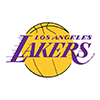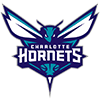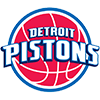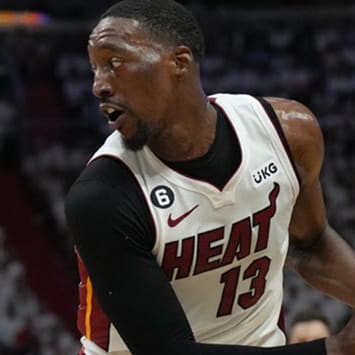This article is part of our Season Review series.
It's never too early to start preparing for next year's fantasy basketball season.
One way we'll help you do that is by reviewing each team, highlighting what went right and what went wrong in 2017-18. We'll also take a look at the current state of the roster to see what moves they could potentially make over the summer, and what impact those could have, from a fantasy perspective.
As we continue to work our way through the reverse order of the regular season standings, it's time to examine the Lakers, Hornets and Pistons.
 LOS ANGELES LAKERS
LOS ANGELES LAKERS
The Good
Julius Randle: Randle started 73 of the 74 games he played for the Lakers two seasons ago, but he was moved to a bench role at the start of this season. Randle went on to average 24 minutes or fewer in each of the first three months and didn't make his first start until the second-to-last game in December.
His production understandably suffered as a result, averaging 12.5 points, 6.3 rebounds and 1.8 assists per game as a member of the second unit. Once he entered the starting five, though, Randle held onto the role for the rest of the season.
Starting again did wonders or Randle's value, as he averaged 18.6 points, 9.1 rebounds and 3.1 assists in that role. He played eight more minutes per game and had a 26.1% usage rate as a starter, which helped him finish the season ranked 95th in Yahoo leagues.
Randle will be a restricted free agent this summer and it's unclear if he will return to the Lakers, who have their eyes set on adding at least one superstar. If Randle can land with a team that will give him a starting role, he could again be a productive fantasy option next year. If he remains in LA, his outlook could be much more clouded.
Kyle Kuzma: With all the hype squarely focused on the Lakers taking Lonzo Ball with the second overall pick in last year's draft, there was very little fanfare around the selection of Kuzma with the 27th pick.
However, Kuzma received significant playing right out of the gate, averaging at least 33 minutes per game in both November and December. He saw a slight decline in playing time for a brief period after that, but was used heavily down the stretch after the Lakers traded Larry Nance Jr. to the Cavaliers.
Kuzma only averaged 26 minutes per game off the bench, but he averaged 37 minutes per contest in his 37 starts. He made the most of his time as a starter, averaging 18.8 points, 7.2 rebounds and 2.5 three-pointers.
Kuzma didn't provide much in the way of defensive stats, but he still was a pleasant surprise by finishing the season ranked 111th on Yahoo. His value next season will largely be determined by who else the Lakers bring in over the summer, but he could provide excellent numbers if given a permanent starting role.
The Bad
Lonzo Ball: Ball showed flashes of being a fantasy force with his ability to contribute points, rebounds and assists, but injuries limited him to only 52 games. He was also a major hindrance with his percentages, shooting an unpalatable 36% from the field and even more horrific 45.1% from the free-throw line.
Ball is going to be a key part of the Lakers' future and his upside is significant. However, his brutal percentages really drag down his fantasy value, and he'll have to prove he can shoot the ball before we give him the benefit of the doubt. It's hard to win your league when your point guard, who should be an asset when it comes to free-throw percentage, struggles so mightily.
With an ADP on Yahoo of 57, Ball actually slightly exceeded his price tag, finishing 44th overall. He should be another early selection next year, especially if the Lakers can add more talent around him. He may never be an asset with his shooting percentages, but his counting stats should remain excellent.
Luol Deng: Give the Lakers credit for going all-in on giving their young players more minutes. Deng played 13 minutes in the first game of the season, then never saw the floor again. Deng signed a four-year, $72 million contract before the 2016-17 season, which immediately became one of the three worst contracts in the league. He played a ton of minutes under Tom Thibodeau in Chicago and his body came out the other side worse for the wear.
The Lakers would love to get out of the final two years of Deng's contract, but that seems highly unlikely since he will be owed at least $18 million in both seasons. In order to move Deng, they'll have to attach multiple future firsts or a young asset like Kuzma, Ball or Ingram -- something they'd only consider if they absolutely have to clear cap space for a superstar or two.
The State of the Franchise
Other than Deng's ugly contract, the Lakers are set up nicely to be significant players in free agency. The second-highest-paid player on the team is Ball at $7.5 million as they are clearing off big money with Brook Lopez and Kentavious Caldwell-Pope both set to hit the open market.
The Lakers will be in on all the big names this summer, including LeBron James and Paul George. They also have some significant decisions to make with their own players like Randle and Isaiah Thomas, who is an unrestricted free agent. The only real negative is that they don't have their own first-round pick, but they won't be shut out of the first-round altogether since they have the Cavaliers' pick.
 CHARLOTTE HORNETS
CHARLOTTE HORNETS
The Good
Kemba Walker: Walker had another strong season, averaging 22.1 points, 3.1 rebounds, 5.6 assists, 1.1 steals and 2.9 three-pointers per contest. His 43.1% field goal percentage wasn't great, but he had a 27.4% usage rate and finished as the 13th-ranked player on Yahoo.
There is no doubt that as long as Walker is a member of the Hornets, he is a tremendous fantasy asset. He's still under contract next season for an extremely team-friendly $12 million, but the Hornets haven't exactly been a pillar of success and may look to trade him if they want to dive into a full rebuild. If he were to get traded to a team with more weapons, he could see his usage rate and fantasy value decline.
Dwight Howard: Howard's career had been on a steady decline, with his scoring average decreasing in each of the last three seasons entering this past season. He's still be a reliable source for rebounds, but the Hawks decided to move on from him last summer and essentially sent him to the Hornets in a salary dump.
Then-Hornets-coach Steve Clifford had ties to Howard from their days with the Magic and Lakers and thought he could be a valuable addition, despite his declining production. Indeed, Howard became one of the focal points of the Hornets' offense, finishing with a 24.2% usage rate, which represented his highest mark since his prime years with the Magic.
The increased role paid off for his fantasy value, averaging 16.6 points, 12.5 rebounds and 1.6 blocks for the season. Howard's field goal percentage was actually down, by his standards (55.5%). And although he shot only 57.4% from the free-throw line, that was his highest mark since the 2010-11 season.
The reunion with Clifford was certainly a factor in Howard's success this year, but that's now a bit of a concern after the Hornets parted ways with Clifford in April. Don't be surprised if Howard struggles to adjust to new head coach James Borrego next season.
The Bad
Nicolas Batum: Batum immediately started out on a sour note, suffering an elbow injury before the season even began. He missed the first 12 games and ended up playing only 64 games overall, his lowest total in the last five years.
With Howard's resurgence, Batum also took a step back offensively, posting just an 18.3% usage rate that was at least three percentage points fewer than either of his first two seasons with the Hornets. Not only did his scoring decline, but he also averaged 4.8 rebounds per contest, his lowest total since the 2011-12 season.
Signed for the next two years at almost $50 million, Batum carries one of the league's most burdensome contracts. He also has a player option for a third year at $27 million, which the Hornets have to expect he'll exercise. If Borrego and his staff get Batum more involved in the offense and if he can stay healthy, he does carry some upside next season and will be on the short list of popular bounceback candidates.
Marvin Williams: Williams has never been a flashy fantasy option, but he has provided value by averaging at least 11.2 points, 6.4 rebounds and 1.6 three-pointers in each of the last two years heading into 2017-18. Like Batum, though, he suffered a significant decrease in his usage rate, finishing at just 14.8%.
Williams also saw a decline in playing time, averaging 26 minutes per game -- roughly four fewer minutes than last season. That had a negative impact on his rebounding numbers, as he averaged just 4.7 per contest.
The Hornets have some promising young frontcourt players in Frank Kaminsky, Cody Zeller and Willy Hernangomez, so don't be surprised if Williams plays fewer minutes again in what could be a more deliberate rebuilding year. He'll likely be sticking around, though, since he is owed $14 million next year while he also has a $15 million player option for 2019-20. Under the current cap environment, that's a tough deal to move.
The State of the Franchise
The Hornets tried to make a playoff push down the stretch but ultimately had too much ground to make up. They played well at home, but will need to improve on their 15-26 record on the road if they are going to get back into the playoffs next season.
If the Hornets are going to improve, it's going to have to be through the draft rather than free agency since they are already projected to be over the luxury tax. If they want to go into a full rebuild, the time is now to trade Walker before potentially losing him for nothing next season. Howard also only has one more year left on his contract, but he'll likely be much more difficult to trade since he is owed almost $24 million.
 DETROIT PISTONS
DETROIT PISTONS
The Good
Andre Drummond: Drummond is one of the best rebounders in the league and is a walking double-double. He also entered 2017-18 having recorded at least 1.5 steals and 1.1 blocks in back-to-back seasons. Despite all those numbers, he still had an ADP of 51 on Yahoo due to his horrid free-throw shooting. With a free throw percentage of 38.9% or lower in three straight seasons, he could single-handedly tank a fantasy team in that category.
This year was a different story for Drummond, who put in a lot of work over the summer to improve his free throw shooting. It paid off in a big way, finishing the season at 60.5%. That wasn't his only area of improvement, though, as he also averaged three assists per contest -- more than double his previous career-high.
Drummond finished ranked 25th on Yahoo, resulting in a ton of added value based on where he was drafted in most leagues. While the assists were a nice bonus, he may see a decline in that area next year with a full season of playing alongside Blake Griffin. After the acquisition of Griffin, Drummond averaged only 1.7 assists per game, compared to 3.9 before the trade. That trend is certainly a concern, but the bigger question will be whether or not Drummond's improvement at the foul line is sustainable.
Reggie Bullock: Bullock started out the season serving a suspension and then saw limited playing time off the bench when he returned. He finally became a regular in the starting lineup in the middle of December, giving him an opportunity to showcase his three-point shooting.
Although he doesn't provide much in the way of rebounds or assists, Bullock did average 12.8 points and 2.3 three-pointers in 52 starts. He was also an asset with his percentages, shooting 49.5% from the field and 84.1% from the charity stripe. After going undrafted in most fantasy leagues, he finished the year ranked 159th overall on Yahoo.
Bullock will at the very least get the opportunity to battle for a starting role next season. The Pistons don't have much cap space and don't have a first-round pick, either, so Luke Kennard and Stanley Johnson will again be his primary competition.
The Bad
Reggie Jackson: After averaging 18.8 points and 6.2 assists in his first full season with Pistons in 2015-16, injuries have hampered Jackson's career. He played only 52 games two seasons ago and was limited to 45 games this year.
Jackson had an ADP of 125 on Yahoo, but finished ranked 205th due to his limited amount of time on the floor. He did average 14.6 points, 5.3 assists and 1.2 three-pointers per game when healthy, showing that he can be a valuable fantasy asset when healthy. His injuries the last two seasons will likely drop him a few rounds in fantasy drafts next year and he might be worth taking a chance on if the price is right.
Stanley Johnson: The eighth overall pick in the 2015 draft, Johnson has yet to live up to expectations. He had mostly come off the bench in his first two seasons in the league, but was given his first significant chance to shine this year by starting 50 of the 69 games he played.
Although he averaged 29 minutes per game as a starter, he only averaged 8.6 points, 3.6 rebounds and one three-pointer per contest. He did provide some value with steals, but he only shot 37.5% from the field overall and ended the season ranked 196th on Yahoo.
Johnson only has one year left on his rookie contract, so this could be his last chance to earn himself a big paycheck. With his limited counting stats and poor percentages, he's unlikely to carry much fantasy value next season, unless he makes significant strides this summer. The talent is unquestionably there.
The State of the Franchise
The Pistons made a significant splash acquiring Griffin from the Los Angeles Clippers. In a league that is moving more toward smaller lineups, the Pistons will try to return to the playoffs with Griffin and Drummond leading the charge.
Griffin saw a slight decline in scoring and rebounding with his new team but increased his assists to 6.2 per contest. He added to his value by averaging 1.9 three-pointers per game for the season, but it came at the expense of his field goal percentage, which dropped to 43.8%. Griffin already doesn't provide much in terms of the defensive categories, and if he keeps shooting this poorly, he won't be providing traditional big men stats. Regardless, Griffin will still be a high-level fantasy asset, but that's still something to keep in mind for your overall roster construction if you do draft him in 2018.












